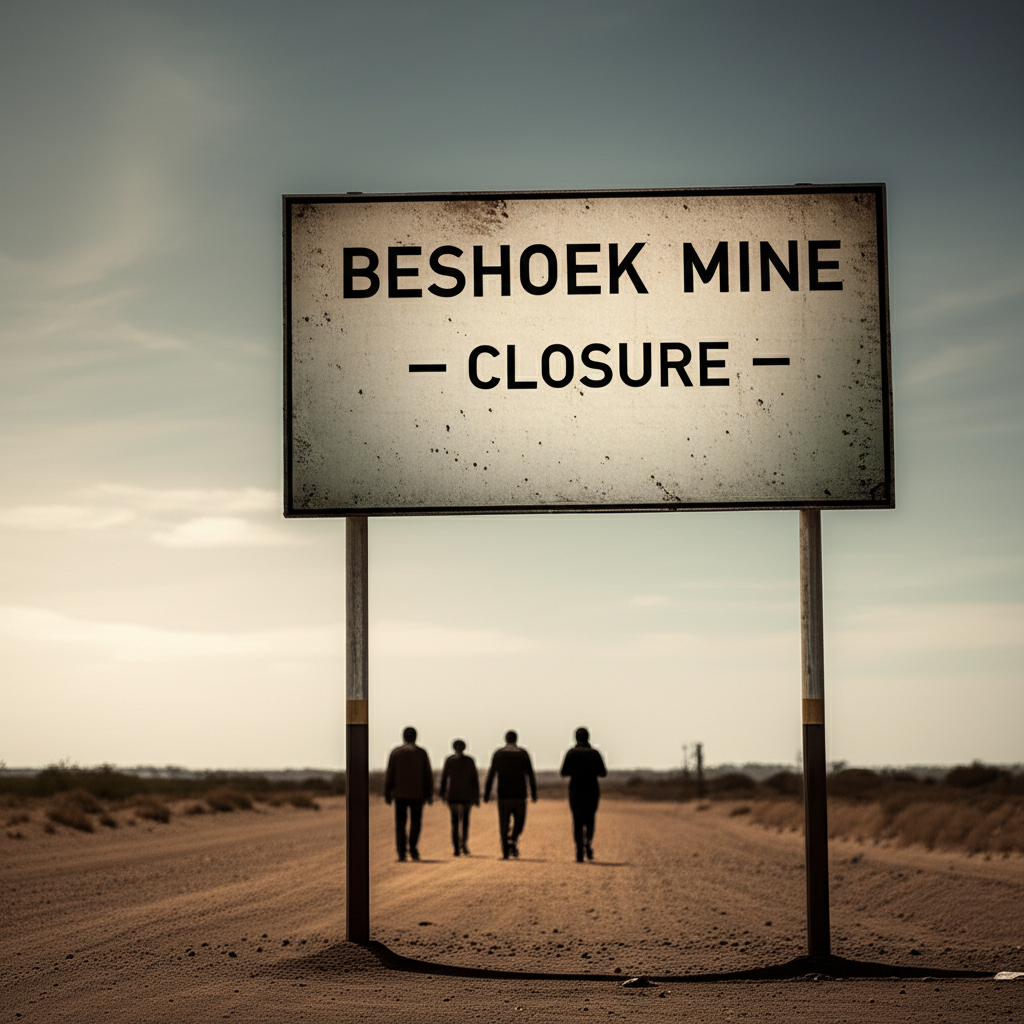The impending closure of Beeshoek Mine in South Africa’s Northern Cape is more than an economic event—it is a seismic shift destined to reshape the community of Postmasburg and ripple across the national economy. For decades, this iron ore operation has been far more than a source of employment; it has been the bedrock of local identity, a catalyst for development, and a critical contributor to South Africa’s export earnings.
Yet, as the mine approaches the end of its lifecycle, the consequences extend far beyond falling production figures. This analysis delves into the layered impact of Beeshoek’s decline: the hemorrhage of jobs, the collapse of local businesses, the unravelling of social structures, and the unintended challenge to entrenched patriarchal norms as women increasingly become economic lifelines.
But within this crisis lies a crucial question—and perhaps an opportunity. Can Postmasburg, and towns like it, pivot from reliance on a single industry toward a diversified, resilient future? This blog explores not just the why and how of the closure, but what comes after—the potential for renewal, the role of policy, and the enduring spirit of a community facing its greatest test.
The story of Beeshoek is a microcosm of South Africa itself—a nation grappling with transition, inequality, and the search for a sustainable path forward.

What well talk about in this article
- A Pillar of the Northern Cape: The Legacy of Beeshoek Mine
- The Inevitable Decline: Understanding the “Why” Behind the Closure
- The Ripple Effect on the SA Economy and Local Business
When the Dust Settles: The Beeshoek Mine Closure and the Future of a South African Community
The beeshoek mine closure south africa represents far more than a simple business decision or a headline in a financial report; it is a slow-motion earthquake shaking the foundations of a community, a regional economy, and the very social fabric that has defined life in the Northern Cape for generations. This isn’t a sudden, dramatic shutdown, but rather the managed, inevitable end-of-life for parts of a mining operation that has been the lifeblood of the town of Postmasburg. As the giant machines fall silent and the rich seams of iron ore run their course, a profound and challenging question emerges: what happens next? The story of Beeshoek is a microcosm of a much larger South African narrative, one that touches upon the national economy, the vulnerability of single-industry towns, the immense human cost of job losses, and the unexpected ways in which economic shifts can challenge deeply entrenched social structures like patriarchy.
A Pillar of the Northern Cape: The Legacy of Beeshoek Mine
To understand the impact of the closure, one must first appreciate the colossal role Beeshoek Mine has played. Located near the town of Postmasburg in the Northern Cape, Beeshoek is an open-cast iron ore mine. It is operated by Assmang, a company jointly controlled by African Rainbow Minerals (ARM) and Assore Limited. For decades, this mine hasn’t just been an employer; it has been the central pillar around which an entire ecosystem was built.
Iron ore is a cornerstone of the modern world. It is the raw material used to make steel, which in turn builds our skyscrapers, bridges, cars, and railway lines. South Africa is one of the world’s top iron ore exporters, and the mines in the Northern Cape, including Beeshoek and its massive neighbour, Khumani, are critical contributors to the nation’s foreign exchange earnings. This revenue is vital for the SAeconomy, helping to fund public services like schools, hospitals, and infrastructure across the country.
For Postmasburg and the surrounding areas, Beeshoek’s influence has been far more direct. The mine provided:
- Direct Employment: Thousands of well-paying jobs for miners, engineers, geologists, mechanics, and administrative staff. A mining job is often seen as a golden ticket, offering salaries and benefits far exceeding what is available in other local sectors.
- Indirect Employment: For every person employed directly by the mine, several other jobs are supported in the local community. This is known as the “multiplier effect.” Think of the bakkie dealership, the local supermarkets, the spaza shops, the security companies, the schools hiring more teachers for the miners’ children, and the construction companies building houses. All of them thrive because of the money the mine pumps into the local economy.
- Infrastructure and Social Investment: Through their Social and Labour Plans (SLPs), mining companies are mandated to invest in the communities where they operate. This often includes building clinics, upgrading schools, and funding community projects. While the effectiveness of SLPs is often debated, their existence creates a level of dependency.
This deep integration means that the mine’s winding down is not just a commercial event but an existential one for the entire region.
The Inevitable Decline: Understanding the “Why” Behind the Closure
It’s crucial to understand that the phased closure of Beeshoek is not necessarily a sign of business failure, but rather a natural part of a mine’s lifecycle. A mine exists for one reason: to extract a finite resource from the ground. Sooner or later, that resource either runs out or becomes too expensive to extract profitably.

This is what geologists call “ore body depletion.” The easily accessible, high-grade iron ore deposits that made the mine viable for so long are diminishing. While exploration might find new deposits, the company’s strategic focus has shifted. Assmang has invested heavily in the newer, larger, and more technologically advanced Khumani Mine, also in the region. From a purely business perspective, this makes perfect sense. Companies must allocate capital to their most productive assets to remain competitive in the global market.
However, this cold business logic has a devastating human cost. The transition from the older Beeshoek operations to the newer Khumani facility doesn’t guarantee a job for every worker. Modern mines often require different skills and are more automated, meaning they can operate with a leaner workforce. The result is a planned, gradual process of retrenchments and a scaling back of operations, which feels like a slow and painful closure to the workers and families who depend on it.
The Ripple Effect on the SA Economy and Local Business
The impact of the Beeshoek mine’s downscaling radiates outwards, from the household kitchen table to the national treasury.
At the National Level:
While the overall sa economy is diversified, the mining sector remains a critical engine. A reduction in output from a major mine like Beeshoek translates directly to lower export volumes. This means less foreign currency entering the country, which can put pressure on the Rand. Furthermore, it means less tax revenue (in the form of corporate taxes and mining royalties) flowing into the government’s coffers. In a country already grappling with a strained fiscus and high social spending needs, every billion rand counts.
At the Local Level:
This is where the impact is felt most acutely. The closure triggers a domino effect that can hollow out a town.
- Business Shutdowns: The first to feel the pinch are the small and medium-sized enterprises (SMEs) that directly service the mine or its employees. The local cafe that sells lunch to miners, the hardware store that supplies equipment, and the transport company that runs buses for workers all face a catastrophic drop in revenue. Many are forced to close their doors, leading to a second wave of job losses.
- Property Market Collapse: As unemployed workers are forced to leave town in search of work, a flood of houses
Business Shutdowns: The first to feel the pinch are the small and medium-sized enterprises (SMEs) that directly service the mine or its employees. The local cafe that sells lunch to miners, the hardware store that supplies equipment, and the transport company that runs buses for workers all face a catastrophic drop in revenue. Many are forced to close their doors, leading to a second wave of job losses.
Property Market Collapse: As unemployed workers are forced to leave town in search of work, a flood of houses hits the market with no buyers in sight. Property values plummet, eroding what little wealth many families had managed to accumulate. This creates a ghost-town effect, where “For Sale” signs become more common than people on the streets, further depressing any remaining economic activity.
The Strain on Municipal Services: With a shrinking population and a collapsing local economy, the Postmasburg local municipality faces a financial crisis of its own. Its primary source of revenue—rates and taxes from businesses and homeowners—dries up. Yet, the cost of maintaining basic infrastructure—water, sewage, electricity, roads—remains. This leads to a vicious cycle of service delivery collapse, making the town even less attractive for any potential new investment or for the few remaining residents.
When the Dust Settles: The Beeshoek Mine Closure and the Future of a South African Community
In the aftermath, the community of Postmasburg is left to confront a daunting and uncertain future. The path forward is fraught with challenges but not entirely devoid of hope. It requires a concerted, multi-faceted effort from every level of society.
1. The Human and Social Reckoning:
The most immediate need is for comprehensive social support. The retrenched miners are not just statistics; they are fathers, mothers, and breadwinners facing an identity crisis alongside financial ruin. Mental health support, career counselling, and financial management workshops are not luxuries; they are essential tools to prevent a surge in substance abuse, depression, and domestic strife. The very social fabric of the community, once woven tightly around the rhythm of the mine, must now be re-knitted.
2. The Unintended Challenge to Patriarchy:
This economic shockwave has a unique and profound gender dimension. The traditional structure of many mining households is patriarchal, with the man as the sole breadwinner earning a stable income, while the woman often manages the home and may engage in informal, smaller-scale economic activities. The mine closure violently inverts this dynamic. As male unemployment soars, it is often the women—with their experience in hustling, trading, and managing scarce resources—who become the de facto heads of household. They may be the ones starting small home-based businesses, selling food, or providing services to keep the family afloat. This forced economic agency, while born of desperation, can potentially lead to a long-term, positive shift in gender dynamics, challenging traditional norms and fostering a more resilient and diversified household economy.
3. Economic Diversification: From Rhetoric to Reality:
The ultimate lesson from Beeshoek is the lethal danger of a mono-economy. The future of Postmasburg and towns like it depends on breaking this cycle. This is easier said than done, but potential pathways exist:
-
Leveraging Existing Infrastructure: Could the mine’s workshops be repurposed for light manufacturing or heavy vehicle repair? Can the railway lines used for ore be used to transport other goods, positioning Postmasburg as a logistics hub?
-
Tourism and Heritage: The Northern Cape has unique landscapes and a rich, if tough, mining heritage. Could niche tourism, focused on the history of the iron ore belt or the region’s natural beauty, create a new stream of income?
-
Agriculture and Agro-processing: With investment in water-efficient technologies, could the region support more robust agricultural projects or the processing of goods from neighbouring areas?
-
Renewable Energy: The vast, sun-drenched landscapes of the Northern Cape are ideal for solar power. Attracting investment in solar farms could create new jobs and provide a new purpose for the land.
4. A National Imperative:
The fate of Postmasburg cannot be its burden alone. It is a stark warning for the dozens of other single-industry towns across South Africa. The Beeshoek closure must serve as a national case study, prompting a proactive, rather than reactive, policy response. This includes creating incentives for businesses to invest in these areas, funding serious feasibility studies for diversification, and ensuring that mining companies’ Social and Labour Plans include robust, sustainable exit strategies that invest in the community’s future long before the last ton of ore is hauled away.
Conclusion: More Than a Mine
The Beeshoek mine closure is a story of geology and global markets, but its true weight is measured in human terms. It is a story of resilience and fear, of loss and potential transformation. The dust from the mine may eventually settle, but the choices made now—by community leaders, by businesses, and by government—will determine whether Postmasburg becomes a footnote in South Africa’s mining history or a pioneering example of how a community can learn to breathe again after the lifeblood of a single industry has run dry. The silence of the mine is not an ending; it is a deafening question posed to the entire nation about what we value and how we build an economy that serves its people, not just its resources.
SCO Summit 2025: Pivotal Key to SA’s Best New World
The SCO summit 2025 might sound like more political alphabet soup, but this high-stakes meeting of giants like China and…
iKhokha’s Ultimate Deal: Best Move for Your Business?
The iKhokha and Nedbank deal has everyone talking, but what does it really mean for your business? Were breaking down…
The Ultimate Guide: Top 10 Startup and Small Business Funding Options in South Africa
Navigating the world of funding for startups in SA can be daunting, but this guide provides a clear roadmap to…
Venezuela Maduro’s Devastating Economic Impact
The name Venezuela Maduro has become synonymous with economic collapse, but how did one of the worlds most resource-rich nations…
Beeshoek Mine Closure: A Devastating Blow for Job Losses
The Beeshoek mine closure South Africa is more than a business headline—its the story of a community facing a seismic…

Empowering South Africa’s Women Entrepreneurs: Funding, Freedom & The Future
August 2025 – Women’s Month in South Africa is more than just a celebration; it’s a call to action. It’s…
SCO Summit 2025: Pivotal Key to SA’s Best New World
The SCO summit 2025 might sound like more political alphabet soup, but this high-stakes meeting of giants like China and…
iKhokha’s Ultimate Deal: Best Move for Your Business?
The iKhokha and Nedbank deal has everyone talking, but what does it really mean for your business? Were breaking down…
The Ultimate Guide: Top 10 Startup and Small Business Funding Options in South Africa
Navigating the world of funding for startups in SA can be daunting, but this guide provides a clear roadmap to…
Venezuela Maduro’s Devastating Economic Impact
The name Venezuela Maduro has become synonymous with economic collapse, but how did one of the worlds most resource-rich nations…
Beeshoek Mine Closure: A Devastating Blow for Job Losses
The Beeshoek mine closure South Africa is more than a business headline—its the story of a community facing a seismic…

Empowering South Africa’s Women Entrepreneurs: Funding, Freedom & The Future
August 2025 – Women’s Month in South Africa is more than just a celebration; it’s a call to action. It’s…
Read More on South African Economy
Beeshoek Mine Closure: A Devastating Blow for Job Losses
The Beeshoek mine closure South Africa is more than a business headline—its the story of a community facing a seismic…
5 Shocking Flaws Killing SA’s Service Sector
Forget the political rhetoric—we expose the 5 brutal flaws that are systematically killing South Africa’s most vital economic sector….






